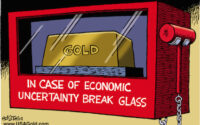ECB Goes Big With Jumbo Hike as Lagarde Hints More to Come
(Bloomberg) — Welcome to the Brussels Edition, Bloomberg’s daily briefing on what matters most in the heart of the European Union.
Most Read from Bloomberg
The European Central Bank hiked interest rates by a historic amount and President Christine Lagarde hinted it could do the same again as part of “several” future moves to escalate officials’ attack against rampant inflation.
Even with a far weaker growth outlook and price increases primarily driven by supply factors, policy makers intensified their aggression with a three-quarter-point increase on Thursday that was an unprecedented monetary-tightening step. The decision matched analyst expectations and brought the deposit rate up to 0.75%.
“If the data on our meeting-by-meeting exercise review suggests that we should take a high hike of our interest rates, we will do so,” Lagarde told reporters in Frankfurt. Addressing the question of how many decisions are “several,” she said that “it’s probably more than two, including this one, but it’s probably also going to be less than five.”
The euro slid against the dollar while she spoke concurrently with Federal Reserve chief Jerome Powell, who declared that the US central bank will act “forthrightly” and won’t flinch in its efforts to curb inflation “until the job is done.”
Money-market investors boosted wagers on further ECB tightening, with bets of another 75 basis-point move in October reaching 40%.
What Bloomberg Economics Says…
“The September hike brings the deposit rate to 0.75% from 0%. We had expected the level to be increased to 1.50% by year-end — that’s our estimate of neutral. However, the statement and the press conference suggest it will end the tightening cycle higher than that, perhaps at 2.25% in February.”
–David Powell, Jamie Rush and Maeva Cousin. Read more here
The decision marks the second consecutive assault on inflation that’s seen euro-zone borrowing costs rapidly exit subzero policy conditions before rising further in the space of less than two months.
The abrupt reversal follows accusations that the ECB reacted too slowly to inflation that began as Covid lockdowns ended and worsened when Russia invaded Ukraine.
“Determined action had to be taken,” Lagarde said. “Inflation remains far too high.”
The ECB raised its outlook for consumer prices this year and next, while slashing its forecast for economic expansion in 2023. The 0.9% projection for growth next year is still more optimistic than the 0.7% median of predictions collected by Bloomberg. Bloomberg Economics sees an advance of only 0.4%.
As the deposit rate rises above zero, the ECB also ended a system of so-called tiering that officials instituted in late 2019 to soften the effect on banks of negative monetary policy. A wider review will follow, according to Lagarde.
Additionally, to prevent an “abrupt outflow” of government cash holdings, the ECB temporarily removed its 0% rate ceiling for remunerating their deposits.
Thursday’s decision highlights how ECB hawks have hardened their grip on the 25-member Governing Council, emboldened by another overshoot in inflation last month to 9.1% — more than four times the goal.
Higher borrowing costs are unlikely to blunt the soaring energy prices behind that spike, with potentially worse to come after Russia halted natural gas supplies through a key pipeline. But the fear is that inflation expectations could spiral without aggressive hikes that will become ever-trickier to enact as Europe’s economy stumbles.
This week already saw political pushback as Spanish Prime Minister Pedro Sanchez warned that monetary tightening “must be made compatible with an economic-recovery path.” As the cost-of-living crisis saps demand, analysts foresee a euro-area recession starting this year, with some saying a downturn is under way now.
The prospects for Germany, the continent’s largest economy, are bleak due to its outsized reliance on the Kremlin for energy. While it has filled gas-storage facilities more rapidly than targeted, they’re not sufficient to exclude rationing during the winter.
But even with Deutsche Bank AG Chief Executive Officer Christian Sewing warning that a recession is coming, Bundesbank President Joachim Nagel wants the battle with inflation to be prioritized over economic growth.
Higher rates may offer some support to the euro, whose slide below parity with the dollar has made imports, particularly of commodities, more expensive. In July, ECB officials “widely noted” that euro depreciation constituted an “important change” and “implied greater inflationary pressures,” according to an account of that meeting.
Lagarde reiterated that the ECB doesn’t target a specific exchange rate but said it’s “very attentive” to the situation around the currency.
Economists polled by Bloomberg reckon the ECB will raise the deposit rate until it reaches 1.5% — broadly where analysts see the “neutral” interest rate that neither stimulates nor constrains the economy.
(Updates with rate forecasts from Bloomberg Economics.)
Most Read from Bloomberg Businessweek
©2022 Bloomberg L.P.
[ad_2]
Source link


